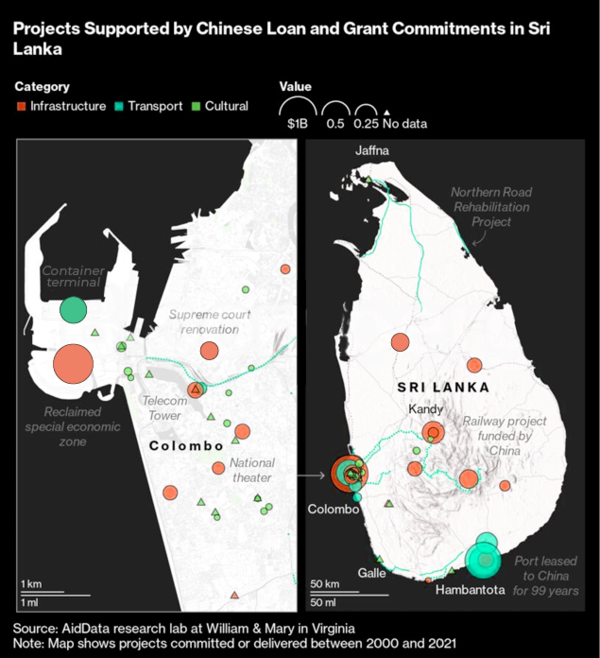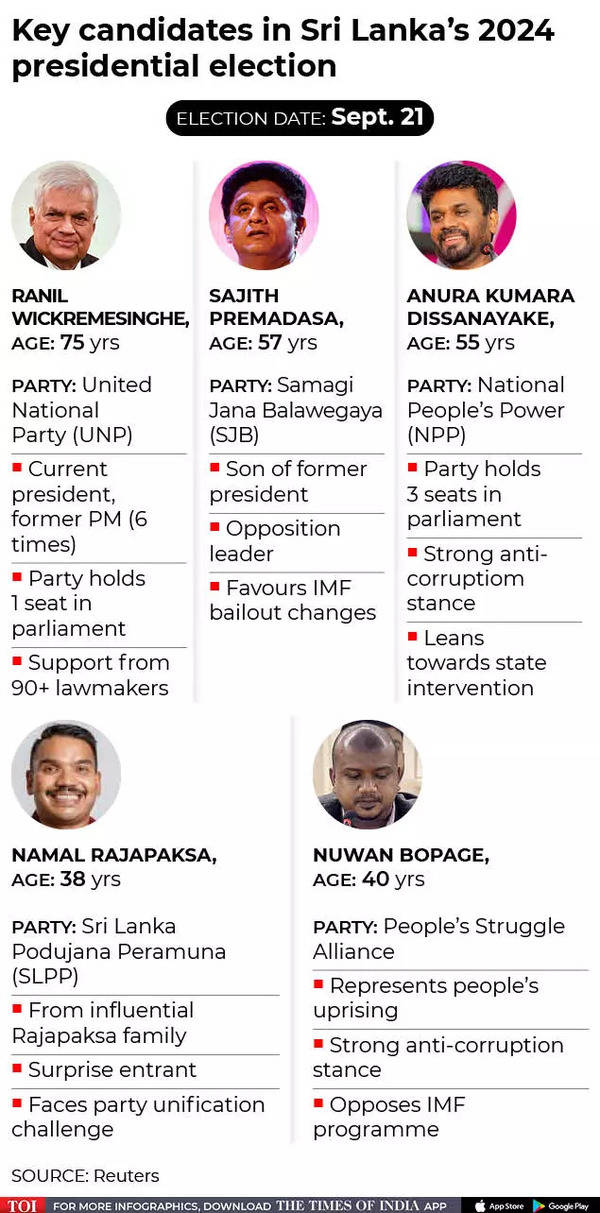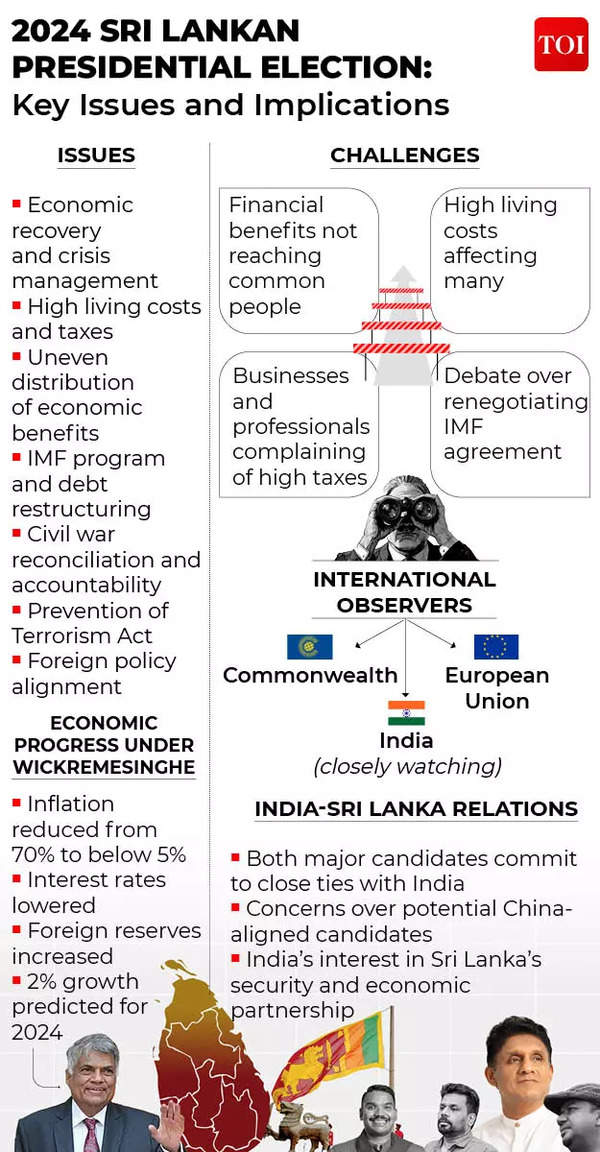pushing the news
- Sri Lanka will hold presidential elections on September 21, 2024, which will be a turning point for the country.
- This will be the first election since the unprecedented economic crisis of 2022, which led to massive protests, political turmoil and the ouster of then-President Gotabaya Rajapaksa.
- The election has attracted a lot of attention, with more than 30 candidates running, including the president
Ranil Wickremesinghe opposition leaderSajith Premadasa and the left wingAnura Kumara Dissanayake , - As 17 million Sri Lankans head to the polls, the island nation’s future hangs in the balance.
zoom in
- The election is being seen as a referendum on the government’s handling of the country’s worst economic crisis in decades. Wickremesinghe, who took power after Rajapaksa’s resignation, has stabilised the economy to some extent by securing a bailout from the International Monetary Fund (IMF) and implementing reforms.
- However, these reforms—which included massive tax increases and the removal of subsidies—have been painful for many Sri Lankans. Inflation has fallen from 70% to below 5%, with Wickremesinghe continuing on his record of economic reform.
- But the question is whether this reform is broad and deep enough to influence voters who are still struggling to make a living.
Why is Sri Lanka important?
- Sri Lanka’s strategic location makes it a key player in maritime trade and regional security. With ports such as Colombo and Hambantota serving as key nodes in global shipping networks, controlling Sri Lanka’s major infrastructure projects has important implications for the broader ambitions of India and China.
- As regional trade expands, Sri Lanka’s ports have become increasingly important for transporting goods across Asia. The Colombo West International Terminal is expected to significantly increase capacity, making Sri Lanka an even more important hub for global maritime trade. This, in turn, makes the island nation a key player in the ongoing geopolitical chess game between India and China.
- “This is a country that is struggling economically, has a lot of bad debt, and that has not brought the country as much economic benefit as it should have,” Nisha Biswal, deputy chief executive of the U.S. Development Finance Corp., said in an interview with Bloomberg. “Sri Lanka is at the crossroads of all maritime commerce that crosses the Indo-Pacific.”
India’s participation in elections
India has been growing concerned about China’s influence in Sri Lanka, especially after Colombo leased the Hambantota port to a Chinese firm. Hambantota, once seen as a major shipping hub, failed to attract container traffic, leading to financial losses and forcing Sri Lanka to hand over control to China for 99 years in exchange for $1.1 billion. The incident has further fuelled India’s concerns that the port could one day become a Chinese military base, but Sri Lankan officials have ruled out the possibility.
However, India is actively working to strengthen its ties with Sri Lanka. Nowhere is this more evident than in the capital Colombo, where India’s Adani Group, backed by US funding, is leading a multi-million dollar expansion of the Colombo West International Terminal. A Bloomberg report says the project aims to boost Sri Lanka’s potential as a major shipping hub in South Asia, as well as act as a geopolitical counterweight to China’s long-running investments in the region.
“This project serves to deepen economic ties, particularly for Sri Lanka, India and the United States,” Chulani Attanayake, a researcher specializing in Sri Lanka’s foreign relations, told Bloomberg. “This is not just an economic venture, but also a geopolitical statement.”
The US has also joined the fray, supporting the port’s development with a $553 million loan through the US Development Finance Corporation. The project signals Washington’s growing interest in countering China’s growing influence in Asia, particularly in countries like Sri Lanka, which have historically been part of China’s Belt and Road Initiative (BRI).
Uditha Devapriya, chief analyst at Sri Lankan foreign policy think tank Factum, told the South China Morning Post: “India will definitely be watching this election very closely. The outcome could significantly impact India’s strategic interests in the region, especially given recent political changes in neighbouring countries.
Nilanthi Samaranayake, adjunct fellow at the East-West Center in Washington and visiting expert at the US Institute of Peace, told SCMP that India will aim to maintain its cordial relations with Sri Lanka as the country has an important role as a neighbour in the region. This is particularly important in view of potential difficulties with Bangladesh after the ouster of Prime Minister Sheikh Hasina.
China’s continued presence
- Despite India’s recent efforts, China remains a major player in Sri Lanka. The Bloomberg report quoted AidData as saying that between 2006 and 2022, China provided $11.2 billion in grants and loans for infrastructure projects in Sri Lanka, far more than the $97 million spent by the US during the same period.
- Nilanthi Samaranayake, a visiting expert at the US Institute of Peace, stressed that regardless of the election results, “bilateral relations (with China) will remain strong.”
- While its infrastructure projects in Sri Lanka have come under scrutiny, Beijing has in recent years reassessed its approach to development financing, making efforts to ensure its loans are more sustainable for recipient countries. China spends about $80 billion in development finance for low- and middle-income countries globally, compared with $60 billion spent by the U.S., according to research by AidData.

Candidates and their implications
There are several major contenders in the election, each of whom could have a potential impact on Sri Lanka’s foreign relations
Current President Ranil Wickremesinghe: Known for his diplomatic acumen, Wickremesinghe has maintained a delicate balance in relations with both India and China. However, his pro-India inclination is seen in his support for currency unification with the Indian rupee and welcoming Indian investments.
Sajith Premadasa: Representing the Samagi Jana Balawegaya (SJB), Premadasa has been vocal against some of Wickremesinghe’s policies, particularly with regard to Indian investments.
Anura Kumara Dissanayake: A potential victory for the NPP candidate could significantly alter the direction of Sri Lanka’s foreign policy, straining relations with India, as well as opening the door to Chinese influence.
Namal Rajapaksa, 38-year-old son of former President Mahinda RajapaksaNamal Rajapaksa represents the continuation of the Rajapaksa dynasty. Despite the family’s downfall, Namal is trying to rebuild his political base, focusing on the legacy of his father’s leadership during the end of Sri Lanka’s civil war.

What is at stake for Sri Lanka?
The outcome of this election will determine the direction of Sri Lanka’s economic reform and its foreign relations. Wickremesinghe’s administration has positioned itself as a pro-Western, pro-India government that invites investment from both countries, while avoiding excessive reliance on China. Wickremesinghe’s victory would maintain the status quo, but would also increase pressure to deliver on economic promises.
Premadasa and Dissanayake have offered different views. Premadasa has not advocated a complete break with China, but he has stressed the need for Sri Lanka to protect its economic sovereignty.
Dissanayake, with his leftist, populist platform, could bring more unexpected dynamism to Sri Lanka’s foreign policy, especially with regard to India. Analysts believe Dissanayake’s victory could encourage China to strengthen its presence on the island, as his party has expressed greater openness to Chinese-backed investments than to Indian projects.

Pollsters suggest that for the first time in Sri Lanka’s history, this election could go into a second round, which could delay final results. This uncertainty is compounded by the broader geopolitical stakes: both India and China are closely watching the election results, as potential changes in Sri Lanka’s foreign policy could impact their own strategic interests in the Indian Ocean region.
(with inputs from agencies)

















